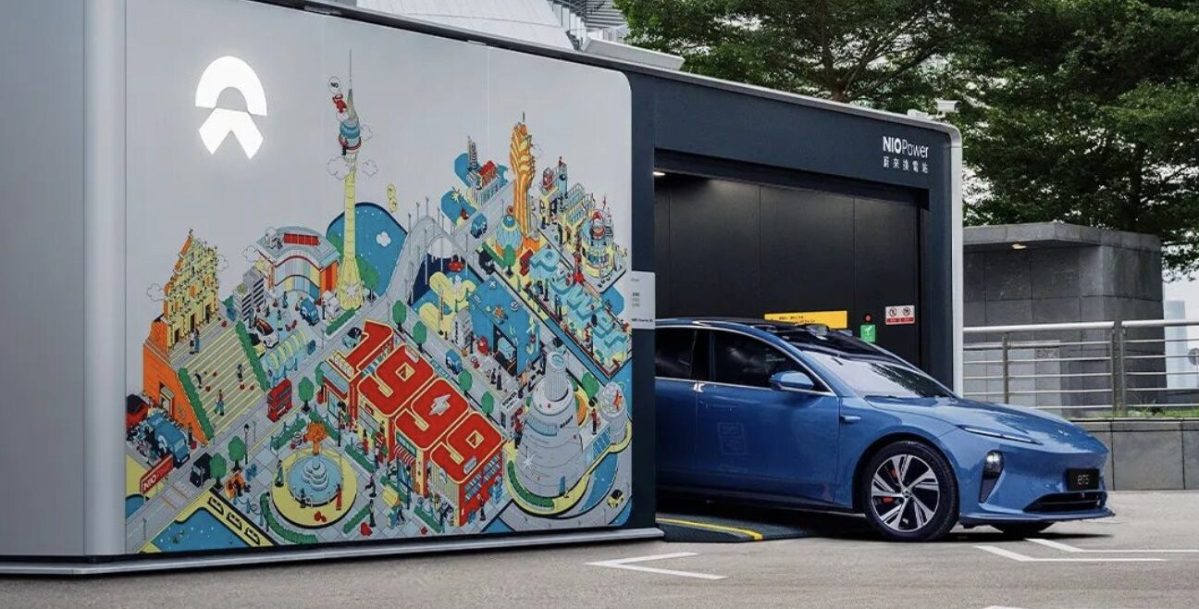More Chinese automakers are planning to adopt NIO’s battery swap technology as two giants join the program – Changan and Geely. NIO on Wednesday said it will partner with Geely to develop a common standard for electric vehicle battery packs and create a sprawling network of swap stations for both consumer cars and commercial fleets, just a week after Changan said it had become NIO’s first ally in a similar effort.
The move could give a further boost to NIO’s long-term plan to split its money-losing recharging infrastructure unit into a standalone business with financing from outside investors, two people with knowledge of the matter told TechNode on Wednesday. Meanwhile, Geely and NIO will explore the possibility of establishing a shared battery swap network in overseas markets, said one of the people, without elaborating further.
NIO and Geely declined to comment when contacted by TechNode on Thursday, referring instead to the announcement published by the two companies.
Car industry experts foresee the acceleration of the Chinese EV industry’s migration to a more unified standard for battery specifications and swap techniques originated by NIO. Still, the EV maker and its bigger allies could face a bumpy road despite their eagerness for a unified swapping standard until a number of business and technical hurdles are cleared.
A common standard?
It is clear that Chinese authorities are behind the move given that Changan is state-owned and given Geely’s position as the poster child for the Chinese privately-owned car industry, said Lei Xing, former chief editor at China Auto Review. Xing expects no real progress to be made within the next 12-18 months given the challenges in achieving a clear consensus for designing new batteries compatible with their recharging networks.
A market-wide standardization may also not happen without government intervention. It’s one thing to require a certain plug type, and quite another to force standardization of batteries and chassis configuration, said Daniel J. Kollar, head of automotive and supply chain at business development consultancy Intralink Group.
“This could have major effects on several design aspects and possibly even lead to certain limits on innovation and supplier choice,” Kollar added.
NIO may also find the need for considerable back and forth with its partners in order to get its swap technology closer to becoming the industry standard. It’s going to be NIO dictating its intellectual property to swapping partners, but Geely and Changan may want to have a say as well, said Tu T. Le, founder of business intelligence firm Sino Auto Insights.
“There’s a lot that needs to be settled still,” Le added, citing Geely running its own swapping system as one reason. Volvo’s parent began operating its first battery swap station for commercial fleets in the southwestern municipality of Chongqing in late 2020, with plans to run 300 more by the end of this year.
A big relief?
Although it is too early to predict where NIO’s power business may end up, it is possible that a new entity jointly invested in by NIO and multiple other carmakers could be in play – something akin to what Huawei recently announced for its vehicle business unit, according to Xing. “This would ease the financial pressure on NIO and make them de facto outside investors of the startup.”
The partnership would probably shoulder some of the investment burden for NIO with cash injections, although it may not help them sell cars, Le said. The increase in adoption of swapping will likely result in short-term improvements to their bottom line, but the big question is if it will result in more vehicle sales.
The Shanghai-headquartered EV maker has built up a nationwide network of more than 2,100 swap stations, each reportedly costing more than RMB 3 million ($420,000) on average. That number is expected to surpass 2,300 by year-end. It delivered 126,067 vehicles for the first ten months of this year, in line with the industry’s average growth rate but lagging behind rivals such as Li Auto.
“It’s hard to see how this is going to change NIO’s fortunes in the long run to a significant degree without added help from their new partners – either via providing a boost to their marketing reach or supporting the development of mid-market solutions,” said Kollar.

